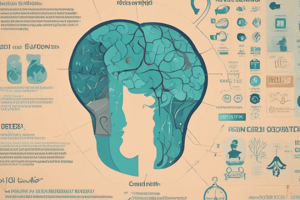Podcast
Questions and Answers
What component of the research protocol addresses the reasons for conducting the study?
What component of the research protocol addresses the reasons for conducting the study?
- Dissemination Plan
- Introduction (correct)
- Analysis Plan
- Methods
Which aspect is NOT typically included in the aims and objectives of a research study?
Which aspect is NOT typically included in the aims and objectives of a research study?
- Main research question
- Testable hypotheses
- Key demographics (correct)
- Tasks to be accomplished
In a qualitative research study, what should be clearly formulated instead of a hypothesis?
In a qualitative research study, what should be clearly formulated instead of a hypothesis?
- Analysis Plan
- Methods
- Research Objectives
- Research Questions (correct)
What is the purpose of the analysis plan in a research protocol?
What is the purpose of the analysis plan in a research protocol?
Which of the following is true about testable hypotheses in a research study?
Which of the following is true about testable hypotheses in a research study?
Which approach is recommended for analyzing qualitative data?
Which approach is recommended for analyzing qualitative data?
What is an important factor in disseminating research to clinicians and policy makers?
What is an important factor in disseminating research to clinicians and policy makers?
Why is public and patient involvement (PPI) essential in clinical research?
Why is public and patient involvement (PPI) essential in clinical research?
Which element is NOT typically included in a research protocol?
Which element is NOT typically included in a research protocol?
Which group is considered a stakeholder in research with public and patient involvement?
Which group is considered a stakeholder in research with public and patient involvement?
Which aspect of the FINER criteria ensures that a research study can be approved by an institutional review board?
Which aspect of the FINER criteria ensures that a research study can be approved by an institutional review board?
What component of the PICOT criteria relates to the specific patient group being studied?
What component of the PICOT criteria relates to the specific patient group being studied?
Which of the following is NOT part of the FINER criteria?
Which of the following is NOT part of the FINER criteria?
What element is crucial for refining a research question according to the document?
What element is crucial for refining a research question according to the document?
Which main type of question aims to understand the development and mechanisms of mental health problems?
Which main type of question aims to understand the development and mechanisms of mental health problems?
What is the primary focus of studies categorized under the Treatment type of research question?
What is the primary focus of studies categorized under the Treatment type of research question?
How does stakeholder views contribute to the formation of research questions?
How does stakeholder views contribute to the formation of research questions?
What does the 'Outcome of interest' component in the PICOT criteria pertain to?
What does the 'Outcome of interest' component in the PICOT criteria pertain to?
Flashcards
FINER Criteria
FINER Criteria
A framework for evaluating the quality of a research question in mental health, prioritizing feasibility, interest, novelty, ethics, and relevance.
Feasibility (FINER)
Feasibility (FINER)
Ensuring a research study is practical to conduct in terms of resources, time, expertise, and number of participants.
Novelty (FINER)
Novelty (FINER)
A research question that adds something new to what is already known; it either confirms, refutes, or extends previous findings.
PICOT Criteria
PICOT Criteria
Signup and view all the flashcards
Research Question Origins
Research Question Origins
Signup and view all the flashcards
Aetiology & Mechanisms
Aetiology & Mechanisms
Signup and view all the flashcards
Treatment Research
Treatment Research
Signup and view all the flashcards
Systematic Literature Review
Systematic Literature Review
Signup and view all the flashcards
Research Protocol Introduction
Research Protocol Introduction
Signup and view all the flashcards
Research Aims & Objectives
Research Aims & Objectives
Signup and view all the flashcards
Hypotheses
Hypotheses
Signup and view all the flashcards
Analysis Plan
Analysis Plan
Signup and view all the flashcards
Dissemination Plan
Dissemination Plan
Signup and view all the flashcards
Qualitative Data Analysis
Qualitative Data Analysis
Signup and view all the flashcards
Public & Patient Involvement (PPI)
Public & Patient Involvement (PPI)
Signup and view all the flashcards
Research Dissemination
Research Dissemination
Signup and view all the flashcards
Research Protocol Contents
Research Protocol Contents
Signup and view all the flashcards
Research Stakeholder Types
Research Stakeholder Types
Signup and view all the flashcards
Study Notes
Core Principles of Mental Health Research
- Formative Assessment Dates: October 14th and December 9th
- Summative Assessment Dates: November 11th (coursework), January 20th (coursework), January 13th (MCQ)
- FINER Criteria: Used to assess the feasibility of a research study. Includes adequacy of subjects, technical expertise, affordability in time and money, and manageable scope. Interesting research questions are key, as well as ones with novel findings, confirming, refuting, or extending previous ones. Ethical approval from an Institutional Review Board (IRB) is required. The research must be relevant to scientific knowledge, clinical practice, and future research.
- PICOT Criteria: A framework to design research questions or studies focusing on patients. Includes considerations for the population, interventions, comparisons (control groups), outcomes with respect to time, and the follow-up period to assess outcomes.
Origins of Research Questions
- Research questions often stem from personal experiences, clinical observations, and inspiration. Literature reviews are essential for refining questions and informing major studies.
Mental Health Research Question Types
- Aetiology & Mechanisms: Focus on understanding the causes and development of mental health problems.
- Treatment: Aims to develop and test interventions for preventing and alleviating mental health issues.
- Experiences: Explore the lived experiences of those with mental health problems and the societal responses to them.
Research Protocol Structure
- Introduction: Context, evidence, rationale, and magnitude of the problem in the research area are highlighted.
- Aims & Objectives: The main research question and related hypotheses are stated.
- Methods: Covers the study design, including sampling, measures, interventions, procedures, analysis plans, and dissemination plans.
- Aims, Objectives, & Hypotheses: The overall goals, specific tasks, and testable hypotheses are outlined.
Hypothesis and Analysis Plans
- Hypothesis: A possible solution to a research question, supported by existing evidence.
- Analysis Plan: In quantitative studies, details on data presentation, comparisons (primary and secondary), and statistical tests are outlined. Qualitative studies have different approaches to the analysis of data and its interpretation.
Dissemination Plans
- Dissemination strategies to reach researchers, clinicians, service planners, policy makers, and the public are crucial.
Public and Patient Involvement (PPI)
- Involving patients and caregivers in the research design process builds trust and enhances the relevance of research. Stakeholder perspectives are invaluable.
Other Crucial Information
- Time and staff requirements: Details of how much time and labor are needed
- Investigator roles: Who will be undertaking what part of the project
- Costs: Funding and financial implications are addressed
- Implications for the NHS: Impact on healthcare systems, particularly in relation to costs, outcomes, and timelines.
Studying That Suits You
Use AI to generate personalized quizzes and flashcards to suit your learning preferences.




